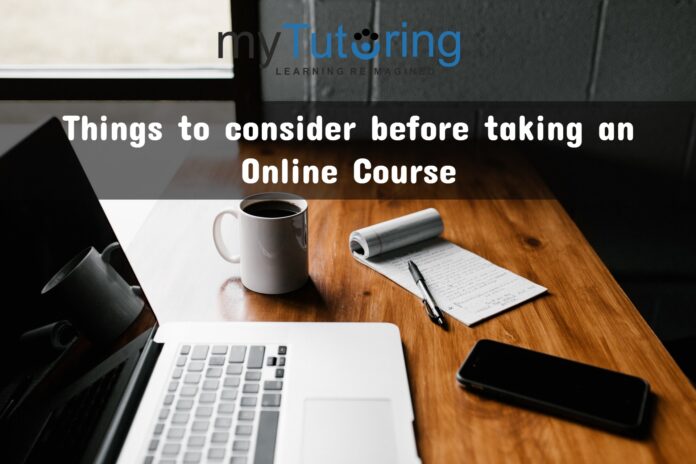Education has evolved in the last few years, with online courses becoming more popular. From management to leadership programs, from data science to cyber security courses offered by Great Learning, there are many courses to choose from. And while there are many good reasons for choosing to pursue an online course, there are many ways you could lose motivation mid-way through.
To help you not lose that initial passion and steam, here are eight things to consider before taking an online course.
Know the why
When you take up an online class, you undoubtedly have good reasons for it. Your reasons might be that you want to build a new skill, want a better job, or change careers. But an online course is not for everyone, and if you aren’t self-motivated, you will most likely give up halfway through. That is why you need to know the ‘why.’ Why are you pursuing this course? You will have an easier time staying focused and motivated when you answer that question.
Know yourself
Once you’ve decided on the online course, determine the best time to study. Maybe you prefer working at night when everyone is asleep, and it’s quieter, or perhaps you can work better in the mornings. Set up a routine and schedule around what time works best for you. You can also set a dedicated space for your studying if possible. Everyone learns differently, so try out different places and times to work to know when and where you are the most productive.
Take time also to understand how you learn and understand concepts. For example, are you an auditory learner or a visual learner? Is it better if you jot down notes on paper or on your computer? One of the advantages of online learning is that you have a lot of freedom to do things your way, so make sure you make the most of it.
Managing your time
Online courses are flexible and you can go at your pace. You can save lots of time because you don’t need to travel and can learn from the comforts of your home. However, even though these courses allow for self-paced learning, you need to learn how to manage your time wisely. That same freedom and flexibility you appreciate in an online course can lead to your downfall. So, consider creating a schedule that you can stick to and follow no matter what.
It will help keep your head over the water even when threatened by waves of assignments and deadlines. Make sure you periodically evaluate your schedule to check whether it works or needs to be changed. For instance, are you spending too much time in one area when you should be prioritizing another? Are the goals you’ve set realistic? When pursuing an online course, you must pace yourself for the length of the course so that you don’t tire yourself midway and get demotivated.
Getting rid of distractions
It would help if you were good at getting rid of distractions to do an online course well. If you entertain distractions, it can quickly become something that demotivates you from your study goals. Instead, try to use these distractions that you like doing as a way to reward yourself once you’ve completed an assignment or exam.
There are times these distractions come in the form of a new season of your favorite TV show or messages from friends, while other times it could be distractions related to studying from home. Maybe a few times a week, you could consider going to a coffee shop or a co-working space.
You could also use apps like Cold Turkey that blocks notifications from your social media accounts to keep you as productive as possible. Be proactive in understanding your distractions and find ways to fight them.
Participation and Networking
A common misnomer is that there is no interaction with your fellow students and professors in an online course, and you are learning in isolation. It is not true. However, you need to make an effort to participate actively and engage with your peers by commenting on their work, sharing a question on the discussion board, or commenting on a thread. Be proactive in asking for help and building relationships with your classmates and professors.
You can also create an online group study to keep you accountable. Further, you can collaborate with your peers on projects or assignments; in fact, most online courses encourage collaboration. Don’t make participation and networking about getting better grades but as an excellent long-term investment in your career.
An actual course with real professors
As you decide to do an online course, remind yourself that it’s an actual course, and you need as much dedication as you would a traditional course. You need to treat it like a real course, not just because it is, but also because you want to walk away with something of worth. One way of reminding yourself is to think about what you’ve paid for the course.
Online courses are also created and taught by highly qualified and competent professors. Online learning is the future, and not surprisingly, many well-renowned universities want a piece of the pie. You might not be able to meet your professors in person as you would in a traditional course, but with technology, there are now many ways to interact and connect with them in a meaningful way.
Being accountable
Even as you set realistic goals and schedules, make it a point to find ways to keep yourself accountable. It can be through an online study group or even a classmate with whom you’ve been able to connect. Being self-aware in an online course is crucial as you need to pay attention to when assignments are due or changes in class timings. Having someone else you can pair up with to share information can be very helpful.
According to internetoflearning Online courses are an excellent option to boost your career, and though there are many advantages in cost, flexibility, and pace, there are many things you need to think through before diving in. Be it cyber security courses online or courses in data science, make sure you do your homework. Great Learning has a wide array of courses for you to explore. If you have any questions, feel free to reach out to us.










![Anso FG Reviews: UPDATED 2024 [ansofg.com] Anso FG Reviews UPDATED 2024 [ansofg.com]](/wp-content/uploads/2023/12/Anso-FG-Reviews-UPDATED-2024-ansofg.com_-100x70.png)







